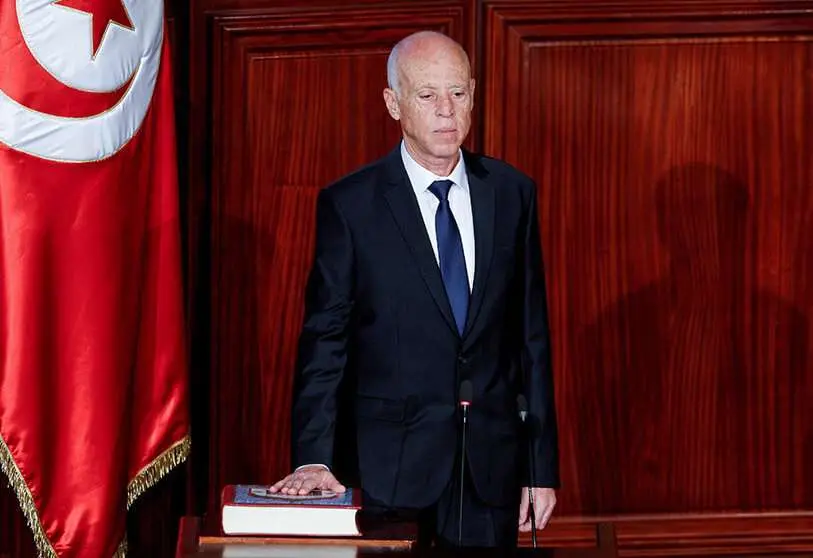Kais Said: "Parliament is a danger to the country"

"Parliament is a danger to the country". With these words, 24 hours before the 30-day deadline established in article 80 of the Constitution, Tunisian President Kais Said announced that he would not restore democratic normality and that he would maintain exceptional powers indefinitely in this North African country that is, ten years later, the only survivor of the so-called Arab Spring. The decision comes a month after President Said dismissed the then Prime Minister Hichem Mechichi, suspended parliament and unleashed a serious constitutional crisis.
On 25 July, following a day of protests in which hundreds of people in several cities demanded the resignation of the government, Said invoked Article 80 of the constitution, which authorises the president to take "exceptional measures" in the event of "imminent danger to the country's institutions". Article 80 of the Constitution does not specify an exact duration for its application, but rather that it will cease "when the circumstances that led to its application are no longer valid". However, it provides that, within 30 days, the President of Parliament or 30 MPs may refer the matter to the Constitutional Court for an assessment of whether the requirements for its application are met.

Regardless of whether the factual situation - marked by a severe health and economic crisis, protests and a prolonged political deadlock - could be considered such an imminent danger, it should be noted that the leader of parliament claims not to have been consulted, the Constitutional Court provided for by the Magna Carta has not yet been constituted, and parliament has been closed for 30 days. In his decree of 25 July, the Tunisian president had given himself 30 days to appoint a new minister and present a roadmap. Although the Tunisian constitution does not allow for the dissolution of parliament, it does allow for the suspension of its functions for a period of 30 days, something that the Tunisian president, whose actions have been condemned by the opposition and who have been accused of carrying out a "coup d'état", took advantage of.
Despite the insistence of the international community, which is calling on him to return to the path of democracy in the only country that has so far survived the failure of the Arab Spring. Said continues on his absolutist path and will therefore maintain all the absolute powers he arrogated to himself and will not re-establish the democratic normality he interrupted on 25 July. Since then, the political parties have been insisting on the need for a road map with a timetable of objectives to be followed during the next stage, as well as speeding up the nomination of the prime minister, which, according to the local press, could be the current governor of the Central Bank, Marouane El Abassi, or the former interior minister and former head of his election campaign, Taoufik Charfeddine.

Since the interruption of democratic normality, he has taken the opportunity to carry out some twenty dismissals and appointments of senior officials in the Ministry of the Interior, including the directors general of National Security, special services and the Security Centre for the fight against terrorism and organised crime. At the same time, the Tunisian judiciary has opened numerous investigations and taken precautionary measures - such as a ban on leaving the territory and house arrests - against senior officials of institutions, magistrates, businessmen and members of parliament.
It has also intensified its attack on political parties, especially the Islamist party, Ennahda, which is going through a serious crisis of values and is struggling to shape its future amid the health problems of its leader, Rachid Gannouchi. The party announced the dissolution of its executive committee and the beginning of a process of "reorganisation that adapts to the requirements of the current (political) scenario, achieves the necessary efficiency and contributes to finding a way out of the exceptional situation Tunisia is experiencing". Political tension and the economic crisis have turned into hostility towards the Islamist party in part of the population, which perceives it as the heart of a new establishment to blame for all ills.

Tunisia's future depends on the decisions taken by political leaders in a region where society is raising its voice to regain the ownership it has lost in recent years. Ten years on, many Tunisians are increasingly fed up with the government's management of poor public services and a political class that has repeatedly demonstrated its inability to govern coherently. On the verge of bankruptcy after ten years of endemic growth, and with poverty and unemployment rates on the rise, Tunisia is also dragging itself into a serious political crisis that is at the root of the institutional conflict. Tunisian President Kais Said's decision to suspend parliament and dismiss Prime Minister Hichem Mechichi places Tunisia in a very serious constitutional crisis.










